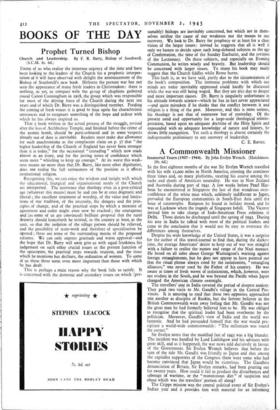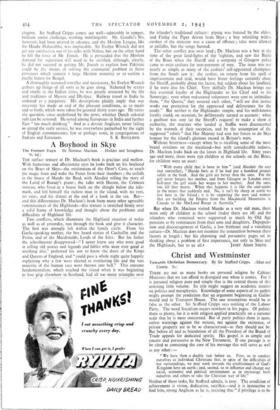A Commonwealth Missioner
IN the first eighteen months of the war Sir Evelyn Wrench travelled with his wife 12,000 miles in North America, crossing the continent three times and, on many platforms, steering his course among the rocks and shoals of American neutrality. He was in New Zealand and Australia during part of i94i. A few weeks before Pearl Har- bour he encountered at Singapore the last of that wondrous over- confidence of the white man which, sublimely indifferent to Japan, pervaded the European communities in South-East Asia until the hour of catastrophe. Rangoon he found in holiday mood, and he was at Lucknow when the tragedy of Singapore befell. The Viceroy invited him to take charge of Indo-American Press relations at Delhi. Those duties he discharged until the spring of 1943. During his stay in India he talked with most of the political leaders and came to the conclusion that it would not be easy to overstate the differences among themselves.
Despite his wide knowledge of the United States, it was a surprise for the author of this travel-journal to find that, during the darkest time, the average Americans' desire to keep out of war was mingled with a failure to realise the-nature and range of the Nazi menace. He heard on all sides about "George Washington's warning against foreign entanglements, but he does not appear to have pointed out that the ritual phrase always cited by the isolationists, " entangling alliances," was never used by the. Father of his country. He was aware at times of fresh waves of -isolationism, _which, .however, were not evident in the South,and he was beyond the Pacific when Japan changed the American .climate overnight. The travellers' stay in India covered the period of deepest anxiety. They paid two visits to Mr. Gandhi's village in. the Central Pro- vinces. It is amusing to read that these two opposites approached one another as disciples of Ruskin, but, the fervent believer in the British Commonwealth went away feeling that Mr. Gandhi was not the great man he had formerly believed him to be. He was obliged to recognise that the spiritual leader had been overborne by the politician. Moreover, Gandhi's view of India and the world was fantastic. And he had persuaded himself that the war would pre- cipitate a world-wide commonwealth : "The millenium was round the corner."
Sir Evelyn notes that the modified fast of 1943 was a big blunder. The incident was handled by Lord Linlithgow and his advisers with great skill, and as it happened, the war news told decisively in favour of the Government. Sir Evelyn Wrench believes that before the turn of the tide Mr. Gandhi was friendly to Japan and that among the capitalist supporters of the Congress there were some who had become convinced that japan would be victorious. The Ganclhist denunciation of Britain, Sir Evelyn remarks, had been pouring out for twenty years. How could it fail to produce the disturbances and sabotage of wartime, or the " monotonous diet " of suspicion and abuse which was the travellers' portion all along? The Cripps mission was the central political event of Sir Evelyn's Indian year and it provides him with material for an informing
chapter. Sir Stafford Cripps comes out well—admirable in temper, brilliant under challenge, working indefatigably. Mr. Gandhi's No, however, had been uttered in advance, and the Moslem League, like the Hindu Mahasabha, was implacable. Sir Evelyn Wrench did not get any satisfaction out of his talks with Nehru, but on the other hand he felt the force of Mr. Jinnah. He is persuaded that the Moslem demand for separation will need to be satisfied, although, clearly, he did not succeed in getting Mr. Jinnah to explain how Pakistan could be the means of solving the communal problem in those provinces which contain a large Moslem minority or to outline a pacific future for Bengal.
A thoroughly seasoned traveller and missionary, Sir Evelyn Wrench gathers up things of all sorts as he goes along. Sickened by scenes and smells in the Indian cities, he was greatly attracted by the life and traditions of Mysore and Dholpur. Railway travel in India he endured as a purgatory. His descriptions plainly imply that war necessity has made an end of the pleasant conditions, as to meals and so forth, which were taken for granted thirty years ago. He raises the question, since underlined by the news, whether Dutch colonial rule can be restored. He noted among Europeans in India and further East " too much drinking " And as a devout Anglican, never failing to attend the early service, he was everywhere perturbed by the sight of English communicants, few or perhaps none, in congregations of































 Previous page
Previous page